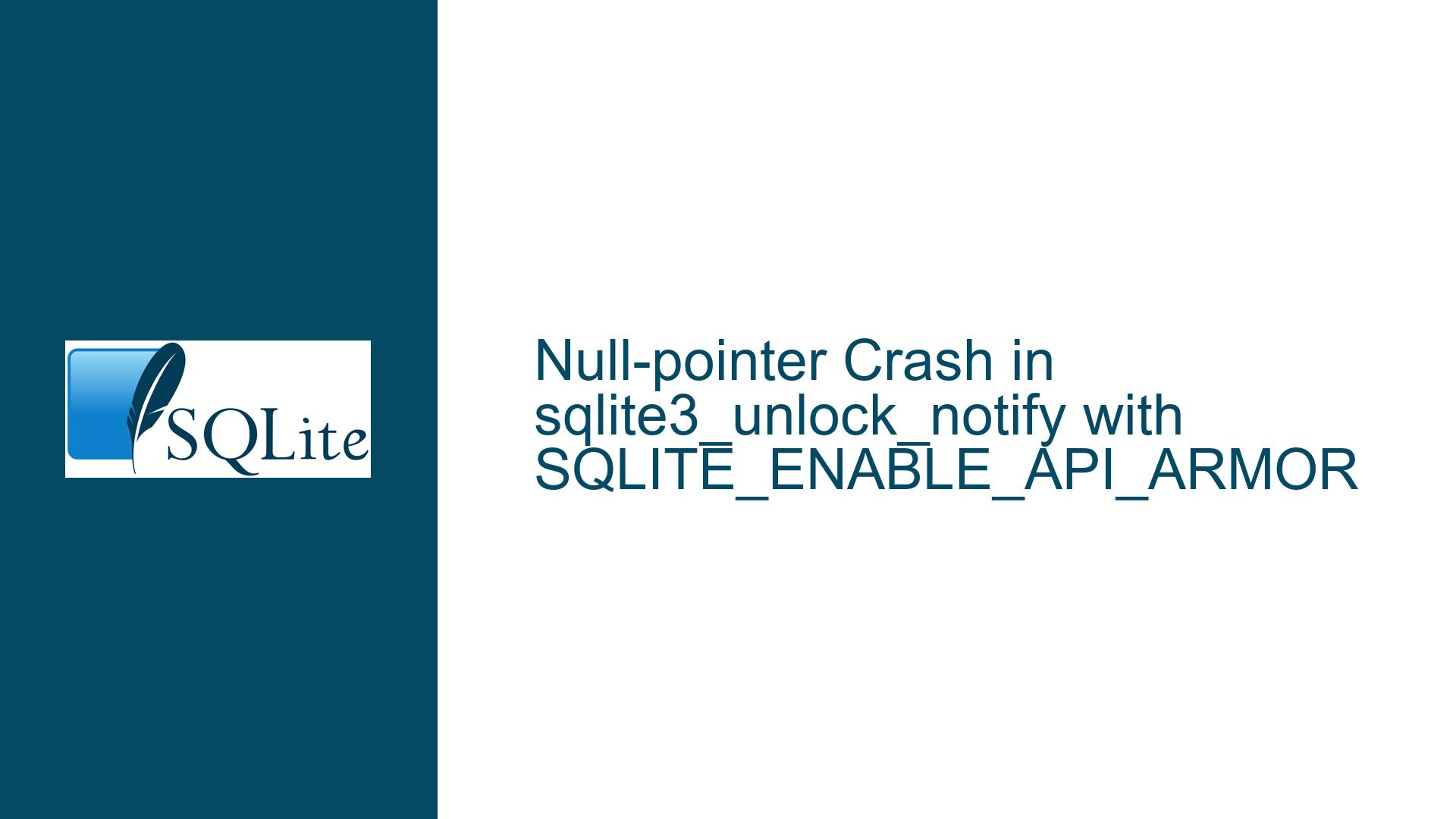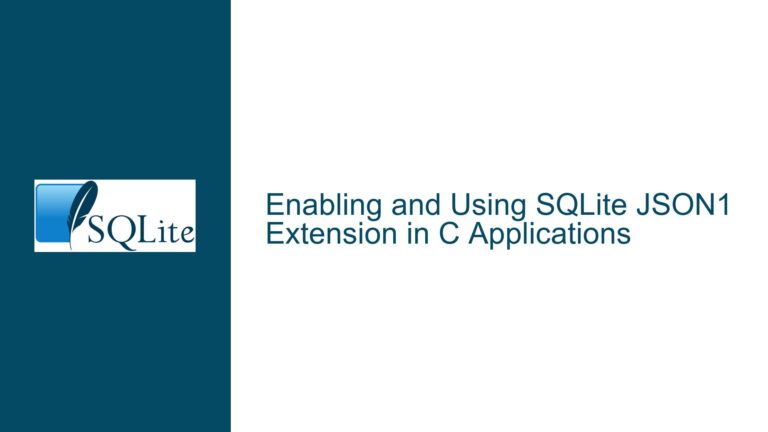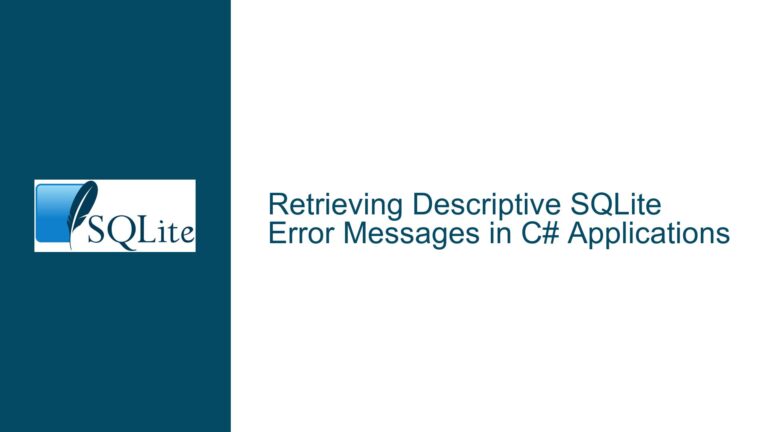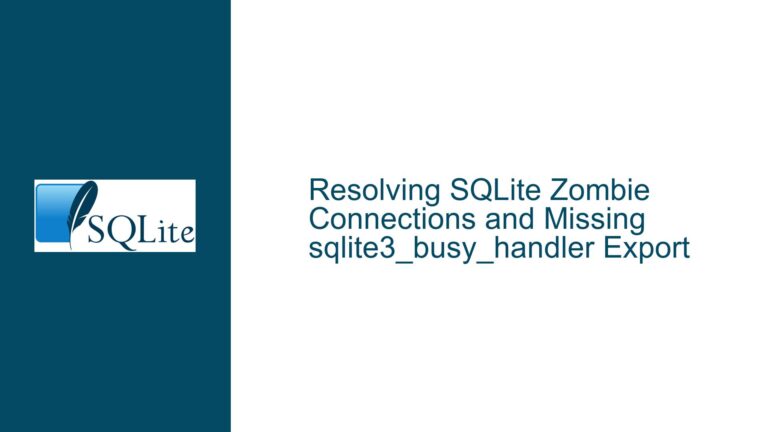Null-pointer Crash in sqlite3_unlock_notify with SQLITE_ENABLE_API_ARMOR
Issue Overview: Null-pointer Dereference in sqlite3_unlock_notify Despite SQLITE_ENABLE_API_ARMOR
The core issue revolves around a null-pointer dereference crash occurring in the sqlite3_unlock_notify function when a NULL database connection (sqlite3* db) is passed to it. This crash persists even when SQLite is compiled with the SQLITE_ENABLE_API_ARMOR flag, which is specifically designed to catch and handle invalid API usage, such as passing NULL pointers to functions that do not accept them. The sqlite3_unlock_notify function, however, appears to lack the necessary pointer validation checks that other SQLite APIs implement when SQLITE_ENABLE_API_ARMOR is enabled.
The problem manifests in scenarios where a developer inadvertently passes a NULL database connection to a sequence of SQLite APIs. While other APIs like sqlite3_busy_handler, sqlite3_limit, sqlite3_prepare_v2, and sqlite3_snapshot_recover correctly detect and handle the NULL pointer due to the SQLITE_ENABLE_API_ARMOR flag, sqlite3_unlock_notify fails to perform this check, leading to a direct crash. This inconsistency in behavior highlights a gap in the defensive programming mechanisms within SQLite’s API implementation.
The crash is particularly problematic because sqlite3_unlock_notify is used to register a callback that is invoked when a database lock is released. This functionality is critical in multi-threaded or multi-process environments where database contention is common. The absence of a NULL check in this function can lead to undefined behavior, making it difficult to diagnose and recover from such crashes in production environments.
Possible Causes: Missing Pointer Validation in sqlite3_unlock_notify
The root cause of the issue lies in the implementation of the sqlite3_unlock_notify function, which does not include a validation check for the db parameter when SQLITE_ENABLE_API_ARMOR is enabled. The SQLITE_ENABLE_API_ARMOR flag is intended to add an extra layer of safety to SQLite’s API by validating input parameters, such as ensuring that pointers are non-NULL before dereferencing them. This flag is particularly useful in debugging and development environments, where catching invalid API usage early can prevent more severe issues downstream.
In the case of sqlite3_unlock_notify, the function assumes that the db parameter is always a valid pointer to an open database connection. This assumption is not explicitly enforced, even when SQLITE_ENABLE_API_ARMOR is enabled. As a result, passing a NULL db pointer leads to a null-pointer dereference, causing the application to crash. This behavior is inconsistent with other SQLite APIs, which perform the necessary checks and return appropriate error codes when invalid parameters are detected.
Another contributing factor is the design of the sqlite3_unlock_notify function itself. Unlike other SQLite APIs, sqlite3_unlock_notify is designed to work with database connections that may be in a locked state. This unique requirement may have led to the oversight in adding the necessary pointer validation checks. Additionally, the function’s reliance on internal SQLite structures and its interaction with the locking mechanism may have made it more challenging to implement the same level of input validation as other APIs.
The issue is further compounded by the fact that sqlite3_unlock_notify is often used in complex, multi-threaded scenarios where database contention is common. In such environments, the likelihood of encountering a NULL db pointer due to race conditions or programming errors is higher. The absence of a NULL check in this function makes it a potential weak point in the application’s error-handling strategy.
Troubleshooting Steps, Solutions & Fixes: Addressing the Null-pointer Crash in sqlite3_unlock_notify
To address the null-pointer crash in sqlite3_unlock_notify, several steps can be taken, ranging from immediate workarounds to long-term fixes. The first step is to ensure that the db pointer passed to sqlite3_unlock_notify is always valid. This can be achieved by adding explicit NULL checks in the application code before calling the function. For example:
if (db != NULL) {
sqlite3_unlock_notify(db, NULL, NULL);
} else {
// Handle the error appropriately
}
While this approach mitigates the issue, it places the burden of validation on the application developer, which is not ideal. A more robust solution would be to modify the sqlite3_unlock_notify function to include the necessary pointer validation checks when SQLITE_ENABLE_API_ARMOR is enabled. This would involve updating the SQLite source code to ensure that the function behaves consistently with other APIs that implement the SQLITE_ENABLE_API_ARMOR flag.
The following code snippet illustrates how the sqlite3_unlock_notify function could be modified to include the necessary checks:
int sqlite3_unlock_notify(
sqlite3 *db, /* Database connection */
void (*xNotify)(void **, int), /* Callback function to invoke */
void *pArg /* Argument to pass to xNotify */
){
#ifdef SQLITE_ENABLE_API_ARMOR
if( db==0 ){
return SQLITE_MISUSE;
}
#endif
// Existing implementation of sqlite3_unlock_notify
}
This modification ensures that the function returns SQLITE_MISUSE if a NULL db pointer is passed, consistent with the behavior of other SQLite APIs when SQLITE_ENABLE_API_ARMOR is enabled. This change would need to be incorporated into the SQLite source code and distributed as part of a future release.
In addition to modifying the sqlite3_unlock_notify function, it is also important to review the overall error-handling strategy in the application. This includes ensuring that all SQLite API calls are checked for errors and that appropriate fallback mechanisms are in place to handle cases where the database connection is lost or invalid. For example, the application could implement a retry mechanism for database operations that fail due to a NULL db pointer or other transient errors.
Another potential solution is to use a wrapper function around sqlite3_unlock_notify that performs the necessary validation checks before calling the actual function. This approach allows developers to enforce consistent error handling across their codebase without modifying the SQLite source code. The wrapper function could be implemented as follows:
int my_sqlite3_unlock_notify(
sqlite3 *db, /* Database connection */
void (*xNotify)(void **, int), /* Callback function to invoke */
void *pArg /* Argument to pass to xNotify */
){
#ifdef SQLITE_ENABLE_API_ARMOR
if( db==0 ){
return SQLITE_MISUSE;
}
#endif
return sqlite3_unlock_notify(db, xNotify, pArg);
}
This wrapper function can be used in place of sqlite3_unlock_notify throughout the application, ensuring that the necessary validation checks are always performed.
Finally, it is important to communicate this issue to the SQLite development team and request that the necessary changes be incorporated into future releases of SQLite. This can be done by submitting a bug report or patch to the SQLite issue tracker, along with a detailed explanation of the problem and the proposed solution. By contributing to the ongoing development of SQLite, developers can help ensure that the library continues to meet the needs of its users and remains a reliable choice for database management.
In conclusion, the null-pointer crash in sqlite3_unlock_notify is a significant issue that can lead to application instability and difficult-to-diagnose bugs. By understanding the root cause of the problem and implementing the appropriate fixes, developers can mitigate the risk of encountering this issue in their applications. Whether through immediate workarounds, long-term code modifications, or contributions to the SQLite project, addressing this issue is essential for maintaining the reliability and robustness of applications that rely on SQLite.






